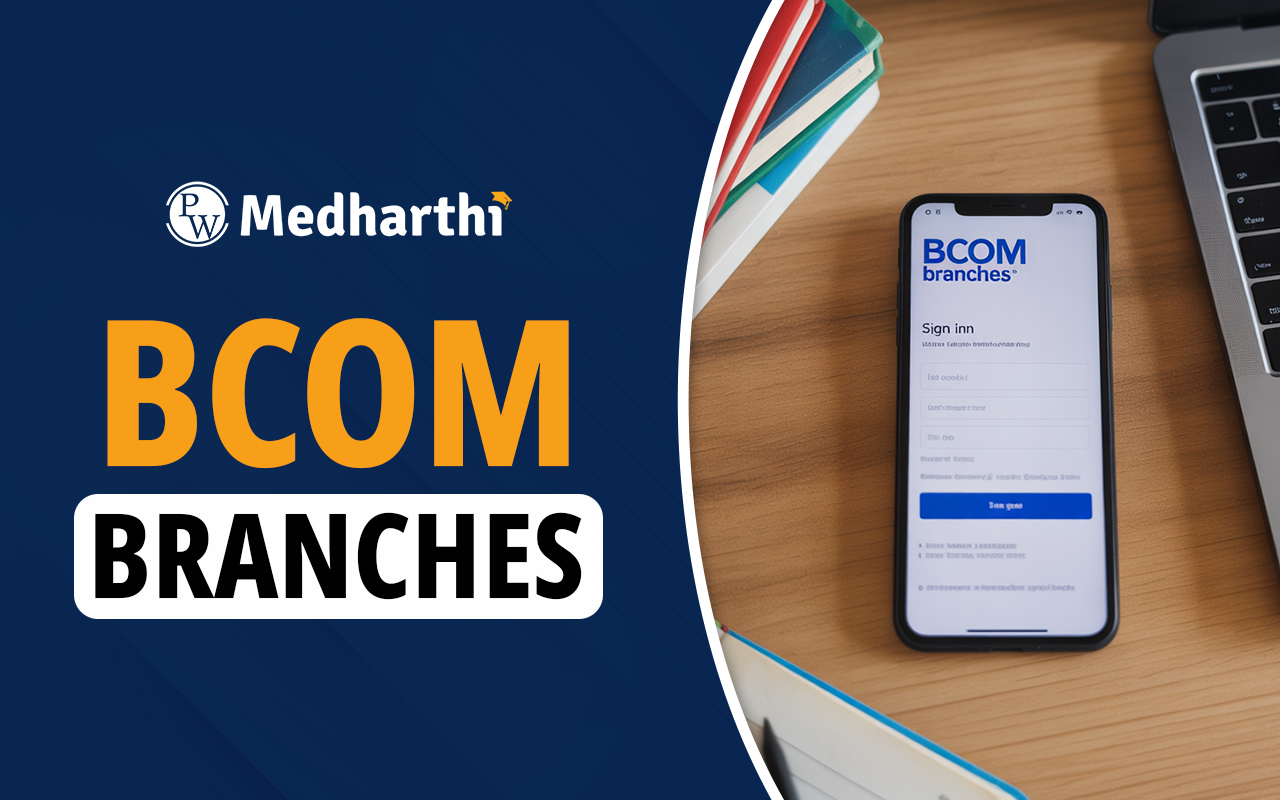
BCom Full Form is Bachelor of Commerce. This course can help students build careers in business, finance, and commerce. This programme focuses on building knowledge in accounting, economics, financial management, etc. Under this course, students learn practical and theoretical aspects of subjects related to Commerce.
Many universities in India offer Bthe Com course in various formats. Common specialisations under this course include Banking, Accounting, Finance, International Business, etc.
BCom Full Form
The full form of BCom is Bachelor of Commerce. It is a widely recognized undergraduate degree that focuses on commerce, finance, and business studies. This course is prepared to provide students with knowledge of in accounting, economics, taxation, business management, and financial planning. BCom provides a foundation for those who wish to pursue careers in banking, auditing, finance, and business analytics. It is also a good option for those who want to continue with professional courses like Chartered Accountancy (CA), Company Secretary (CS), or an MBA. The program spans three years, six semesters.
What is BCom?
The full form of BCom is Bachelor of Commerce. It is an undergraduate course available in many universities in India in various formats like online, offline, honours, and distance. Here, students learn to handle business operations, maintain financial records, and understand market trends during this course. Students can choose to pursue professional courses such as Chartered Accountancy, Company Secretary, or an MBA after completing this UG programme. Further, here is the course overview:
|
BCom Course Overview |
|
|---|---|
|
Particulars |
Details |
|
Full Form |
Bachelor of Commerce |
|
Duration |
3 Years for offline courses, variable for online courses or honours programmes |
|
Level |
Undergraduate |
|
Stream |
Commerce |
|
Specialisations |
Accounting, Finance, Taxation, Banking, etc |
Note: The course duration and available specialisations may be different between universities. Candidates should check the official websites of universities before applying for BCom admission.
Eligibility for BCom Course
Universities require aspirants to meet certain criteria before joining the BCom programme. The eligibility rules ensure students have a foundation in commerce or related subjects. Further, here are common eligibility norms:
|
Common Eligibility for BCom Course |
|
|---|---|
|
Criteria |
Details |
|
Educational Qualification |
Completion of Class 12 from a recognised board |
|
Minimum Marks |
45 to 50 % marks aggregate in most universities |
|
Admission Basis |
Merit or entrance examination |
|
Age Limit |
There is no upper age limit in most universities |
Note: Some universities may have additional subject requirements. They can follow reservation policies as prescribed by the Indian government. Candidates should confirm their eligibility for admission by visiting their choice of university or online portal.
BCom College in India
Many universities in India offer BCom with different specialisations, academic support, and placement opportunities. Candidates generally choose colleges on the basis of course structure, faculty, and career options. Additionally, candidates can read about the following colleges for BCom colleges in India:
|
BCom College in India |
||
|---|---|---|
|
College or University |
Location |
Specialisations Offered |
|
Manipal University Jaipur |
Rajasthan |
Accounting, Finance, and Taxation |
|
Sikkim Manipal University |
Sikkim |
BCom and MBCom with Finance |
|
DY Patil University |
Maharashtra |
Banking, International Business |
|
Shoolini University |
Himachal Pradesh |
BCom with E Commerce |
|
Chandigarh University |
Punjab |
Accounting, Business Analytics |
|
Shobhit University |
Uttar Pradesh |
General, Taxation |
|
Amrita Vishwa Vidyapeetham |
Tamil Nadu |
Finance and Accounting |
|
Vivekananda Global University |
Rajasthan |
Corporate Finance and Marketing |
|
Jain University |
Karnataka |
BCom Professional and Finance |
|
NorthCap University |
Haryana |
Financial Services and Business Law |
Note: Candidates can check the official web portal of these universities to check the availability of their desired specialisations in BCom course.
Job After BCom Course
BCom graduates have several career opportunities in the public and private sectors. They can work in finance, taxation, auditing, banking, and business management. Further, the following job roles are popular after completion of BCom:
|
Jobs After BCom Course |
|
|---|---|
|
Job Role |
Description |
|
Accountant |
Maintains financial records and prepares ledgers for organisations |
|
Financial Analyst |
Analyses financial data, market trends, and advises businesses |
|
Auditor |
Checks internal and external accounts to ensure compliance |
|
Tax Consultant |
Guides individuals or companies on tax planning and filing |
|
Banker |
Works in commercial, private, or investment banking |
|
Business Executive |
Manages business operations, client relations, and marketing activities |
Note: Students who pursue additional certifications like CA or CS along with BCom programmes can achieve better opportunities in specialised roles.
Salary After BCom Degree
The salary for BCom graduates varies depending on the job, sector, and experience. Also, candidates can receive high income if they pursue some additional courses as per the demand of the industries. Further, candidates can refer to the following salary scale at entry-level:
|
Indicative Salary After BCom Degree |
|
|---|---|
|
Job Role |
Average Annual Salary in INR |
|
Accountant |
4.5 to 6.5 Lakh |
|
Financial Analyst |
5.5 to 6.5 Lakh |
|
Auditor |
3 to 5.5 Lakh |
|
Tax Consultant |
3 to 6 Lakh |
|
Banker |
4 to 7 Lakh |
|
Business Executive |
2.5 to 5 Lakh |
Note: The above-mentioned salary figures are averages and vary depending on city, industry, and company. Candidates should also confirm the current salary trends for their chosen industry.
| Other Related Links | |
| Courses After Online BCom | SMU Online BCom Course |
| Jain University Online BCom | Online BCom Scope |
BCom Full Form
What is the full form of BCom?
What is the duration of the BCom programme?
Which specialisations are available in BCom?
What are the career options after BCom?
What is the average salary after BCom?






